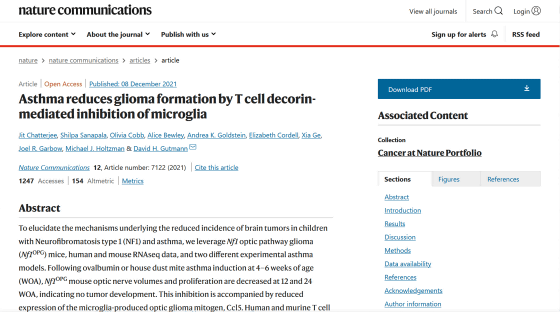Why are asthmatics less likely to develop brain tumors?

Chronic inflammation of the airways caused by allergies causes the muscles surrounding the bronchi to contract and narrow the air passages with slight irritation.
Asthma reduces glioma formation by T cell decorin-mediated inhibition of microglia | Nature Communications
https://www.nature.com/articles/s41467-021-27455-6

Asthma may reduce risk of brain tumors — but how? – Washington University School of Medicine in St. Louis
https://medicine.wustl.edu/news/asthma-may-reduce-risk-of-brain-tumors-but-how/
We Just Got Closer to Understanding Why Asthma Might Protect From Brain Tumors
https://www.sciencealert.com/there-sa-strange-perk-to-asthma-it-comes-with-fewer-brain-tumors
Since the beginning of the 21st century, it has been pointed out from the results of large-scale epidemiological studies that 'patients with asthma have a low incidence of brain tumors.' However, the relationship between asthma, which is a bronchial and lung disease, and brain tumors is not understood, and some researchers dismissed it as a mere coincidence.
However, a 2015 paper published by a research team at the University of Washington also showed that children with genes that are more likely to develop tumors along the optic nerve pathway are less likely to develop asthma than the general population. Subsequent studies have found evidence that brain tumors in these children are caused by the interaction of T cells involved in the immune response, which eliminates viruses and pathogens, and microglia, which are involved in the repair of nervous tissue in the cerebrospinal cord, with the optic nerve. it was done.
Since it is known that T cells are deeply involved in asthma, which is an allergic disease, the research team wondered how T cells are involved in asthma and brain tumors, and asked mice. He said he conducted an experiment using it. In the experiment, mice that were genetically modified to develop optic nerve tumors were exposed to asthma-inducing stimulants in some groups at 4-6 weeks of age and in saline in another group. The research team then examined the mouse brain at 3 and 6 months of age to see if there was a tumor in the optic nerve.
As a result, it was found that mysteriously, brain tumors did not develop in mice with asthma, whereas tumors were formed as expected in mice without asthma. The results of this study suggest that there are some factors that inhibit the formation of brain tumors while causing asthma.

In a further experiment, the researchers investigated the behavior of T cells in asthma-induced mice and found that after the onset of asthma, T cells began to secrete a protein called 'decorin.' On the other hand, T cell decorin secretion did not increase in mice that did not develop asthma.
Decorin is known to exacerbate the symptoms of asthma when it acts on tissues around the airways, but the study also found that decorin secreted by the central nervous system interferes with the activation of microglia. It can also be explained that decorin inhibits the growth of brain tumors because activated microglia infiltrate brain tumors and substances derived from microglia promote the growth of tumor cells.
'Of course, we're not going to do anything to induce asthma to anyone (even to prevent brain tumors),' said Dr.

Related Posts:
in Science, Posted by log1h_ik







